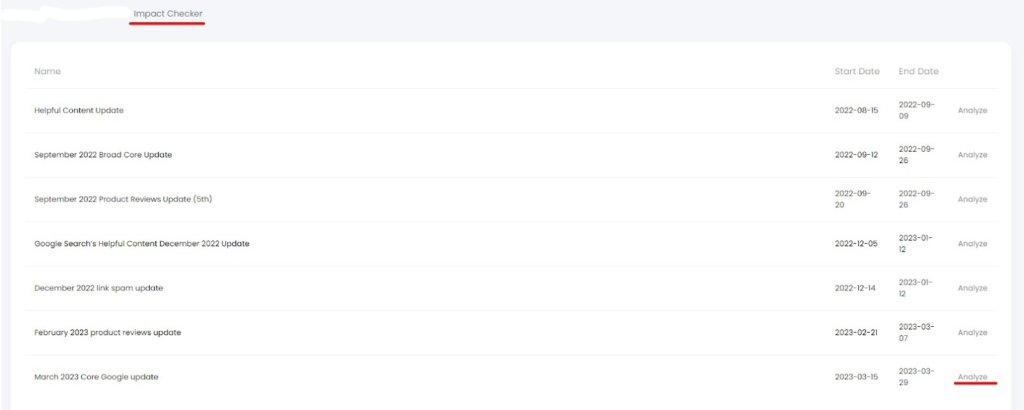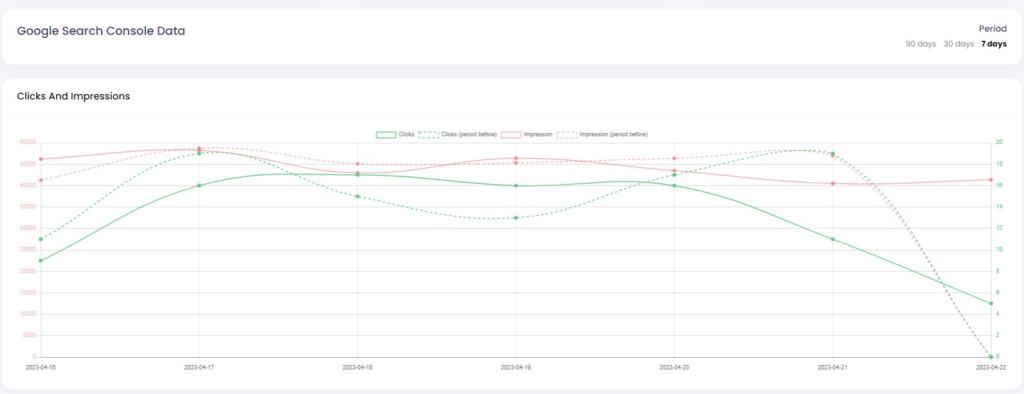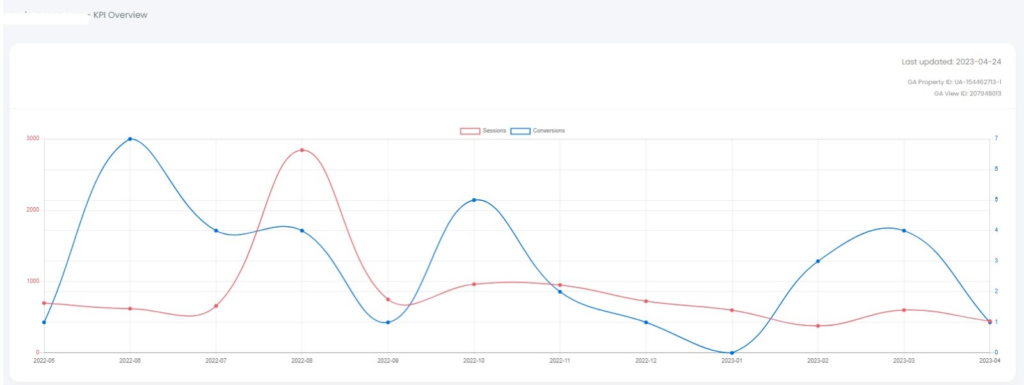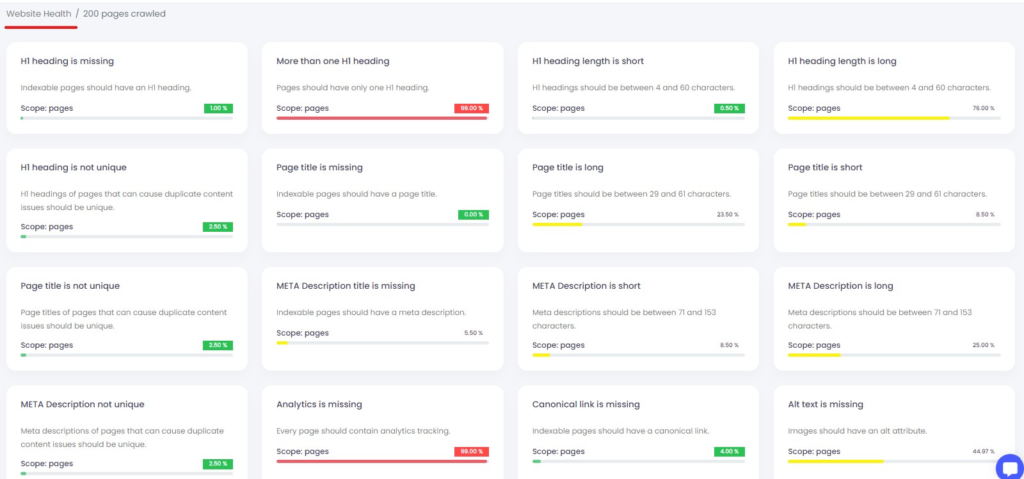Google has recently announced another update to its reviews system – and it’s called “April 2023 Reviews Update”. It started to roll out on the 12th of April, 2023. It will take about 2-3 weeks for it to roll out completely.
The Google April 2023 Reviews Update emphasizes experience-based content. That means creators and marketers must be aware of the changes and adapt to them accordingly.
If your site publishes any review content, this update is crucial to watch. The SEOLeverage™️ app’s Impact Checker feature can check your rankings to see if your organic traffic has improved, declined, or stayed the same.

And should you need SEO guidance, SEOLeverage™️ professionals can help you succeed in the new reviews landscape.
Key Takeaways:
- Google broadened its scope of review updates. It now covers reviews on products, services, destinations, media, and other reviewable topics.
- Google has shared best practices for creating high-quality reviews.
- Google has altered the language in different parts of its guidance documentation related to product reviews to apply all types of reviews.
Table of Contents
If you have been affected by the Google March 2023 Core Update we have an article with tips to recover traffic.
Overview of the April 2023 Reviews Update
One month after the release of the March Broad Core Update, Google is now rolling out its April 2023 Reviews Update. You’ve read that correctly! Google has removed “product” from the name. The system now covers reviews about products, services, media, and other reviewable topics.
Here are some of the important things you must know about this update:
| Name | April 2023 Reviews Update |
| Launch Date | April 12, 2023, at noon EST (9 AM PDT) |
| Rollout | It will take two to three weeks to roll out completely. |
| Targets | All types of reviewable topics, including services and businesses, media, and destinations. |
| Language Impacted | English, German, Spanish, Indonesian, Vietnamese, French, Italian, Dutch, Russian, Polish, and Portuguese. |
| Impact and Recovery | Assuming improvements were made, content impacted by this update might not recover until Google released the next update. But Google emphasized that its automated assessment of review content is just one of the factors used in ranking content. So changes may occur at any time for several reasons. |
| Previous Product Review Updates | There have been six updates on Google’s product review updates since 2021. Google has now redirected its prior pages providing guidance regarding the “product reviews” updates to its revised “reviews” guidance. |
How the New Review System Works
The April 2023 Review Update is accompanied by new Google Search Central documentation offering direction to the type of content that the new review system is looking for.
Before the update was released, it was called “Google Search’s product reviews system and your website.” But today, it changed its name to “Google Search’s reviews system and your website.” The former page is now 301 redirecting to the latter.
According to Google, its new reviews system works to make sure that users will see reviews sharing in-depth research instead of thin content. It is also designed to evaluate blog posts, articles, pages, and other first-party standalone content written to provide a recommendation, analysis, or opinion. Reviews can be about one thing, comparisons, or lists of recommendations.
Important Note: Google’s new review system will not evaluate third-party reviews. Examples are those posted by customers in the page’s reviews sections.
Significant Changes You Must Be Aware Of
In addition to its name change, here are some of the significant changes you should know about upon the release of this update:
Focus on E-E-A-T
Google’s new reviews documentation leans heavily on what it calls the Double-E-A-T content quality paradigm. This new search rater guideline supersedes E-A-T, which stands for Expertise, Authoritativeness, and Trustworthiness. The addition E stands for Experience.
The new review system is looking for evidence of experience. Adding phrases like “my hands-on analysis” or “in my experience” to reviews is believed to help the page increase in SERPs rankings. Whether these reports are just coincidences or accurate, the recent update emphasizes that the standard for demonstrating experience is higher than just words on the webpage.
Signals of Experience
The new review documentation has provided the following list of signals of experience. These prove that the product or service has been handled, used, tested, and measured.
1. Visual evidence
These include original photos of the product, service, or business being reviewed. These images are essential to demonstrate genuine interaction with the product.
Take high-quality photos of what you are reviewing. Stock photos won’t be sufficient.
2. Quantitative measurements
Quantitative means the measurement of a quantity. Collect and present data like performance metrics to provide high-quality content that meets the requirements of the review update.
3. Audio and visual experience
Google has not provided clear examples of what an audio or visual experience should be. However, this could mean showcasing the visual display quality of the device or its noise level. You can do the guesswork when it is appropriate. It might not apply to all reviewable topics, but if you think your product or services page needs one, provide such valuable information for your readers.
Why Should You Care
If your website is publishing any review content, you must watch out for this important update. Check your rankings to determine if your organic traffic declines, improves, or stays the same.
The SEOLeveage app is a useful tool for such. You can easily see your site’s Google Analytics Data and Search Console Data on your dashboard. You can check your site’s performance for the past seven days for up to 90 days.


The app also lets you easily look into your site’s KPI overview.

Google on High-Quality Reviews
Google’s review system update has raised the bar for reviews. It has become crucial for webpages to provide actual evidence of experience. Though low-quality reviews might still rank, your page will only remain competitive if you focus on providing experience-based, genuine content.
Why Google focuses on reviews
Here are possible reasons why Google constantly releases updates on its ranking systems, including its search reviews system:
User Feedback
Through extensive user testing, Google learned that users appreciate reviews that share in-depth research instead of one that simply summarizes a list of products. Google may have frequently been receiving such kind of feedback because, around the same time, updates on reviews were launched.
Additionally, Google may have been receiving bad press about how their algorithm ranks reviews content.
Displaying review content in Google SERP
Another potential reason why Google focuses on quality reviews is that it can display the content it gathers from content creators and publishers directly on its search results page.
Widespread release of low-quality, low-effort reviews online
Google elevates the standard for high-quality reviews, most probably because of the dramatic increase in the number of affiliate posts Google is crawling and indexing. This could result in a huge rise in poor-quality affiliate content.
What does Google consider high-quality reviews?
Publishing reviews will help users learn more about the things they are considering, including products, destinations, services, movies, games, and other topics. Thus, Google emphasizes that you must write reviews as:
- A blogger providing an independent opinion.
- A merchant or expert staff guiding people to choose between competing products.
- An editor at a publishing site.
Additionally, Google shared the best practices for creating high-quality reviews. Here are some of them:
- Evaluate from the user’s perspective.
- Show you’re an expert.
- Take note of the signals of experience – provide evidence and share quantitative measurements.
- Discuss the pros and cons of something based on your own research.
- Describe how products have evolved over the years – focus on the improvements made and issues they addressed.
- Add links to other relevant resources to help readers make the right decision.
- Include links to multiple sellers to allow readers to choose products from their merchant of choice.
- Include why you are recommending a product over the others, with first-hand evidence.
Final Thoughts
Staying informed about SEO’s latest developments is crucial. Regularly check for updates from reliable sources. Also, monitor and analyze your site’s performance metrics. Determine which areas need improvement and adjust your SEO strategies accordingly.

By doing so, you can better prepare your content and website to combat Google’s algorithm changes. And you'll remain competitive in today’s constantly changing digital landscape.
By knowing, understanding, and adapting to Google’s April 2023 Reviews Update, your webpages will continue to thrive. If you need further guidance, do not hesitate to get in touch with SEOLeverage™️ digital team.

